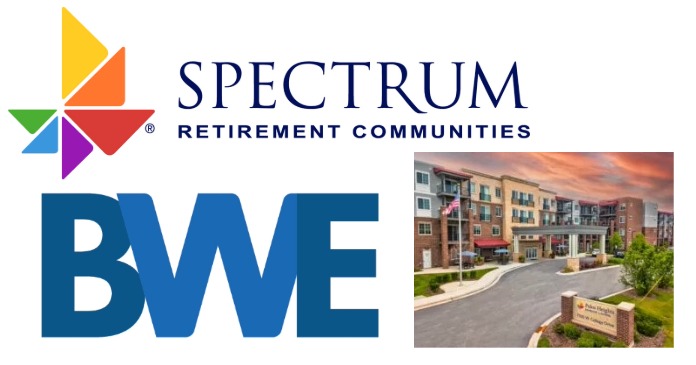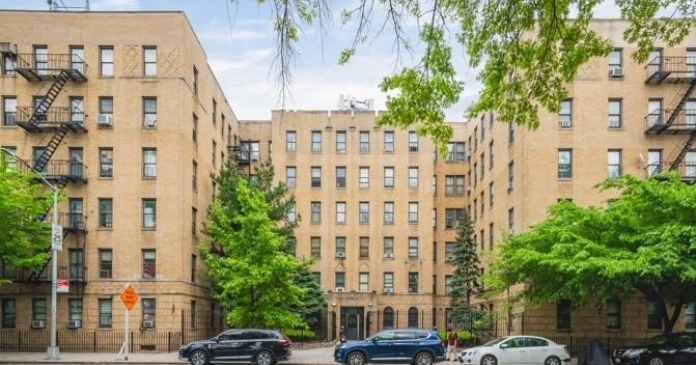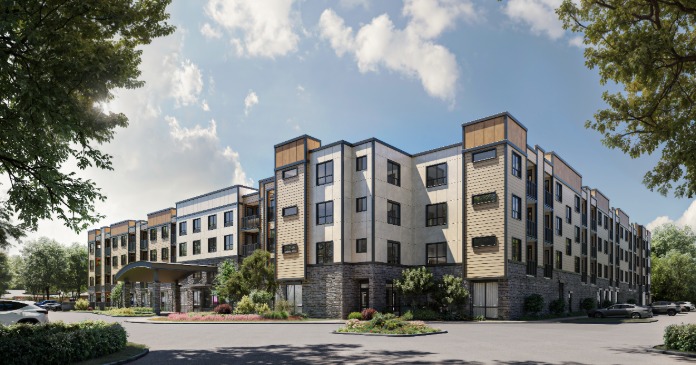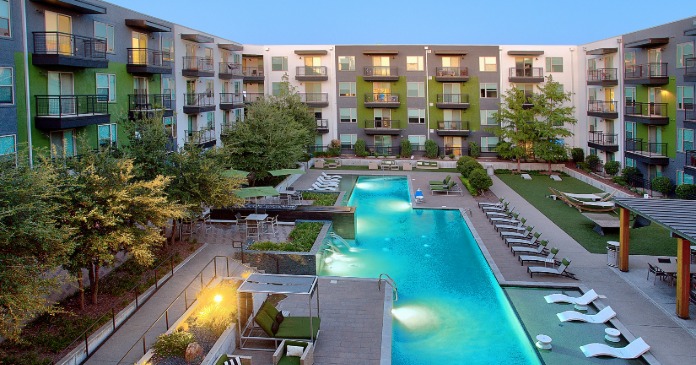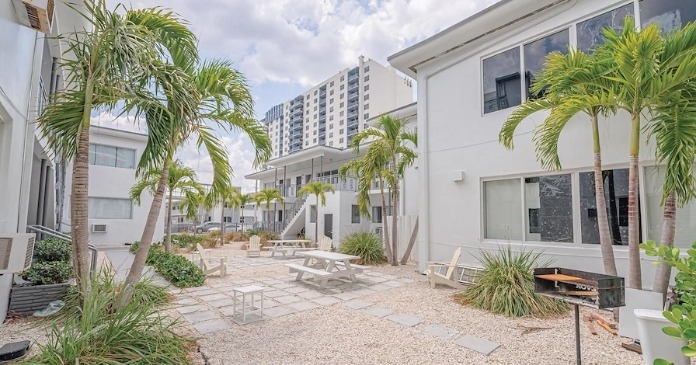Although on-campus housing likely will remain a necessity, recent research by the National Multi Housing Council suggests that college students actually elect to live off campus in apartment communities replete with social gathering spaces, the latest technological advancements, hotel-like amenities and well-appointed units. Those preferences have spawned a new niche of purpose-built Class A resort-style student housing communities that require a property management skill set much different from that of conventional rentals.
“Student housing is similar to senior housing in that it’s very resource intensive. But with the students, there is more staff required and a different type of maintenance involved,” said Rick Jones, regional vice president of Lane Company’s new student housing management division. Staff and maintenance personnel must be available 24 hours a day, seven days a week, making sure the gyms, the tanning beds, the hot tubs and the club rooms are clean and operational.
But the biggest challenge to operating student housing is marketing, and its application can mean the difference between success and failure. Purpose-built student apartments are typically leased by the bed, co-signed for by parents and guaranteed for 12 months. But almost three quarters of the units turn over each year between May and July. Marketing is a year-round task, because the opportunity to increase occupancy falls off dramatically if the property isn’t entirely pre-leased by August, “After the students move in in August and September, we start the lease-renewal process immediately and try and lock them in early for the next year, so that they can focus on their studies. But students are fickle and they enjoy change, not because they aren’t happy, but because they want to experience different things. So marketing is huge, you have to continually market yourself to them to encourage them to stay, to let them know that this community is where all their friends are going to be next year,” said Jones.
Balancing act
Student housing is a partnership model, unlike conventional apartments, where owners can operate independently. A successful student housing community must create a living/learning environment that addresses the safety concerns of parents, the social needs of the students and the academic needs and requirements of the universities.
“The housing where students live plays a huge role in their grades, as well as school retention,” said Jones. According to statistics from the National Center for Higher Education Management Systems, the national drop-out rate among freshman is 30 percent and half of the students who enroll in college never graduate.
“We must make sure we are developing good students, not just keeping them happy and entertained. It’s a huge social experiment covering all the bases. You have parents in the mix and must make sure that they are comfortable with where their kids are living. You have to keep all those balls in the air with the schools, the parents and the kids. And you are marketing to each group differently,” Jones said.
“To the students, it must be a fun place to live and to the parents you are marketing a safe place to live. To the universities and even to high school guidance counselors, it’s important for them to know that where the kids live will contribute to how well they do academically. They don’t care that you have a pool table and a swimming pool. They are concerned that freshman will establish habits they are going to carry with them throughout their college life.
“Some young people away from home for the first time may not be prepared to live well on their own with too many distractions, and that is also a concern for parents who want to know they can trust the management company to be surrogate parents, to watch over their kids and their well-being while they are in our care. And that’s a delicate balancing act that we have,” said Jones.
Lane Company’s student housing staff works closely with colleges and universities, which set requirements for their students’ housing, at times requiring all freshmen, and sometimes even sophomores, to live on campus. “The University of Louisville has statistics that show that students who live on campus under their care and guidance score better on tests. And we have to recognize that that is a true concern. Since we are partners with them, we must ask how we can help them achieve their objective, because ultimately achieving their objective is academic success. We, too, want them to succeed because they’ll stay in school and continue to be residents of ours,” he said.
Marketing to the echos
Marketing to the millennials, who are closer to their parents than previous generations, but also have grown up with the latest technology, is a huge hurdle to overcome. This demographic is the first to grow up with computers in the home, the Internet and cell phones. “Lane Company has done a lot of development and a lot of lease-ups—all transferable skills—but there are new sets of policies and technologies to be employed that are not the normal course of business in conventional apartment management. We are rolling out more integrated social media campaigns like Facebook, Fourquare and Loops and keeping our ear to the ground for emerging trends. We must stay up on ever-changing communications technology and learn how to apply those communication skills to students and then to our overall business,” said Jones.
Who better to reach the echo boomers, than the echo boomers themselves? An example is a program devised for student housing owner/ operator Pierce Education Properties by BG Creative, a San Diego marketing agency that specializes in public relations, social media marketing, internet marketing, advertising and design, that increased traffic to the sales office at a student housing community in Michigan by 41 percent, leading to the property’s highest renewal rates and new leases ever.
BG Creative sent its youngest team to the property to mingle with students and discover their needs, wants and local hangouts and create a positioning statement that summed up their findings, laying the foundations for the Pierce brand, “It’s all about you.” The process, right up to and including first presentation, was led by the youngest BG Creative employee, less than a year out of college, and included a complete overhaul of Pierce’s Website and development of a social media campaign that was irreverent and funny and spoke directly to the college audience.
Residents are the best assets
“One of the good things about student housing is that you’ve got people who live at your communities who are good at those things. We use resident assistants and tap into their knowledge, because traditional marketing departments don’t get it, but the resident assistants do. So being able to harness them has been fun and eye-opening for the rest of our group. We have to be able to learn to communicate on their level and learning new things helps us adapt to these new markets and it is fast-changing, because what’s cool today is not what’s going to be cool tomorrow,” said Jones.
The concept of the resident assistant began in the dorms, but is being utilized by savvy operators at off-campus, purpose-built student housing communities. “We tap them to be part-time employees and to offer assistance to us and it helps with the staffing of the community. They love it because it gives them real-world experience. For many of them, it’s the first job they have ever had. It’s a part-time job while they are going to school and they can offer marketing assistance in areas that they are interested in and going to school for. They can apply those skills in a real-life work environment and build a resume,” said Jones.
Some resident assistants even become full-time employees like Tiffany Ruddell, who worked as a resident assistant while attending Coastal Carolina University as a history major. “She worked part-time with Lane Company regional property manager Wesley Deese at the 1,092-bed Campus Edge. She did a fantastic job marketing a new community, so when she graduated last month and we had an opening, we brought her here and she is head of our leasing team in Louisville,” said Jones.
Jones sees Lane Company’s student housing business as an incubator for future long term residents. “This group of students we rent to now will be future residents for our conventional apartments. As we perfect our marketing skills to this generation with their specific needs, we are going to be ahead of the game in promoting our conventional business when they are ready to move into conventional housing after graduation,” he said.
Author Wendy Broffman




